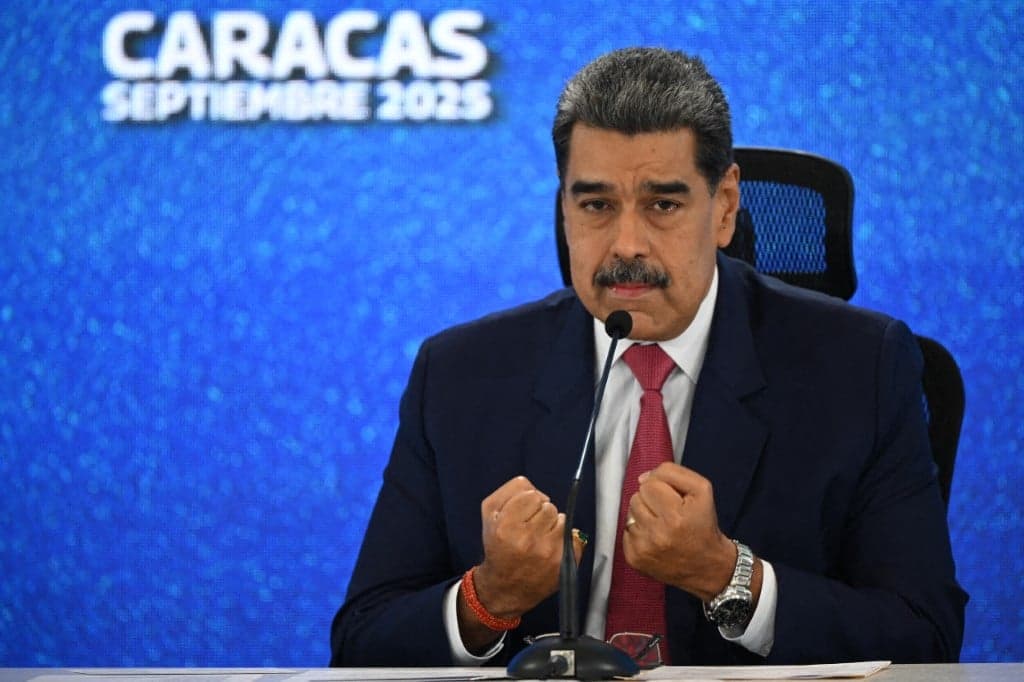We're loading the full news article for you. This includes the article content, images, author information, and related articles.
Tensions escalate in the Caribbean as the US deploys the world's largest warship and continues lethal strikes against alleged 'narco-terrorists,' prompting Venezuelan President Nicolás Maduro to accuse Washington of provoking conflict.

Venezuelan President Nicolás Maduro on Friday accused the United States of “fabricating a new eternal war,” following a significant escalation of US military presence in the Caribbean Sea. The statement came as the Pentagon announced the deployment of the USS Gerald R. Ford, the world's largest aircraft carrier, to the region and confirmed another lethal strike against a vessel allegedly operated by drug traffickers.
US Defense Secretary Pete Hegseth announced on Friday, October 24, 2025, that American forces had conducted their tenth strike since early September, destroying a boat in the Caribbean allegedly belonging to the Tren de Aragua criminal organization. Hegseth stated that "six male narco-terrorists" were killed in the operation, which he noted was the first to be carried out at night. This latest strike brings the total number of people killed in these operations to at least 43, according to US officials.
The Trump administration has framed these military actions as a necessary component of its campaign against drug trafficking and transnational criminal organizations, which it has labeled "narco-terrorists." In a social media post, Hegseth declared, “If you are a narco-terrorist smuggling drugs in our hemisphere, we will treat you like we treat Al-Qaeda… Day or NIGHT, we will map your networks, track your people, hunt you down, and kill you.”
The deployment of the USS Gerald R. Ford carrier strike group represents a major enhancement of US military assets in the area, which already include numerous warships, a nuclear submarine, and advanced F-35 aircraft. The aircraft carrier, commissioned in 2017, displaces over 100,000 tons and can carry more than 75 aircraft. Pentagon spokesperson Sean Parnell stated the deployment would “bolster U.S. capacity to detect, monitor, and disrupt illicit actors and activities.”
This buildup has been interpreted by many, including the Venezuelan government and independent analysts, as a direct threat aimed at destabilizing President Maduro's government. Maduro, for whom the US has offered a $50 million reward for information leading to his arrest on charges of narcoterrorism, has repeatedly denied the accusations and claims the US objective is regime change. “They are fabricating a war that we are going to prevent,” Maduro told state media on Friday.
The US strikes, conducted without a congressional declaration of war, have raised significant legal questions both within the United States and internationally. Members of the US Congress from both parties have questioned the legal authority for the attacks. The Trump administration has reportedly justified the operations under its constitutional Article II powers and has informed Congress it considers those targeted as “unlawful combatants,” a term used during the post-September 11, 2001, conflicts. However, legal experts have argued that drug trafficking does not meet the international law definition of an “armed attack” that would justify such use of military force.
Regional leaders have also voiced their concerns. Colombian President Gustavo Petro has criticized the strikes, stating that some of the deceased were fishermen, a claim that has intensified diplomatic friction with Washington. Brazilian President Luiz Inácio Lula da Silva urged the US to halt its interventionist policies, advocating for cooperation through judicial institutions rather than military action. In response to the perceived threat, Venezuela has reportedly mobilized its military and civilian militias and deployed Russian-made anti-aircraft missiles.
While the immediate focus of these events is Latin America, the broader implications resonate globally, including for Kenya and East Africa. The US administration's expansive interpretation of its authority to conduct lethal strikes against non-state actors designated as 'terrorists' could set a precedent for similar operations elsewhere. This strategy, merging counter-narcotics with counter-terrorism, could influence international approaches to combating drug trafficking networks that operate along the East African coast.
Furthermore, any significant destabilization in Venezuela, a major oil-producing nation, could have ripple effects on global energy markets, potentially impacting fuel prices in Kenya. The situation also highlights the ongoing geopolitical tensions between the US and nations it deems adversarial, a dynamic that often draws in other countries and international bodies. For now, the situation in the Caribbean remains a point of high tension, with the international community closely watching the potential for further escalation. FURTHER INVESTIGATION REQUIRED.
Keep the conversation in one place—threads here stay linked to the story and in the forums.
Sign in to start a discussion
Start a conversation about this story and keep it linked here.
Other hot threads
E-sports and Gaming Community in Kenya
Active 9 months ago
The Role of Technology in Modern Agriculture (AgriTech)
Active 9 months ago
Popular Recreational Activities Across Counties
Active 9 months ago
Investing in Youth Sports Development Programs
Active 9 months ago